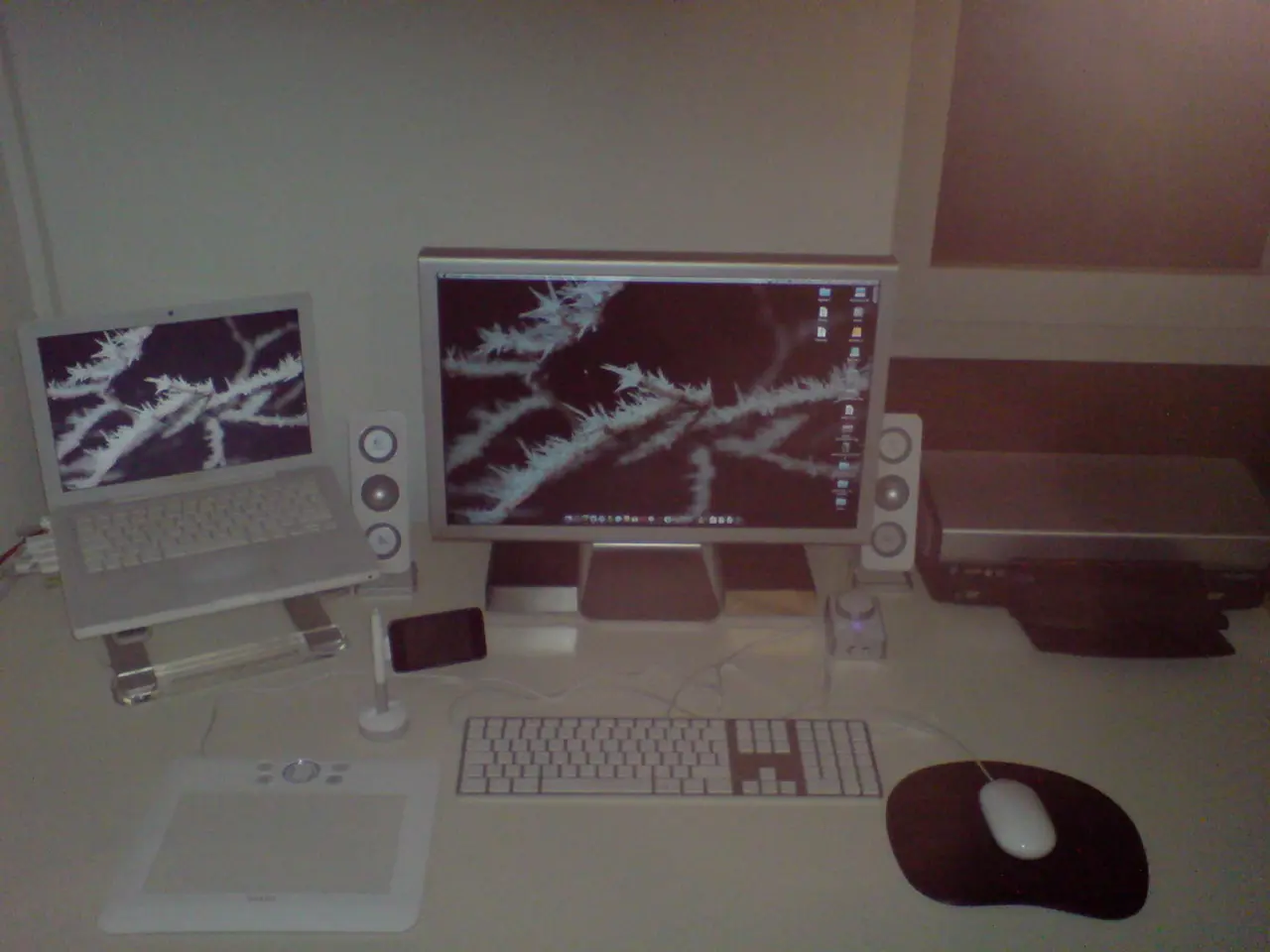Retro-futuristic Cyberdeck offers Pi-driven productivity, embodying a blend of old and new technology.
==============================================================================
The Dual-Screen RPI Dev Cyberdesk, a brainchild of modder and developer SECTOR 07, is a cyberpunk-inspired DIY project that merges retro-futuristic aesthetics with the versatile Raspberry Pi 5 platform. This unique device boasts two 9-inch rotating touchscreens, a mechanical keyboard, and a sleek 3D printed enclosure adorned with angular lines [1][2][3].
At its core, the Cyberdesk is divided into three dedicated boards. One handles power management and programmable buttons, another processes I2C sensor data, and a third exposes the 40-pin GPIO header for shield compatibility [1]. These components are connected to the Raspberry Pi via flexible flat cables, ensuring clean internal wiring and a slim profile [3].
The assembly process of the Cyberdesk was intricate, requiring meticulous debugging to get it functioning properly, as demonstrated in Sector 07's YouTube teardown [1]. The dual 9-inch screens are mounted on custom 3D-printed rotation mounts with miniature ball bearings, offering smooth movement and firm locking in portrait or landscape mode without wobble [1].
A compact mechanical keyboard, linear volume slider, four programmable macro keys, and a rotatable encoder with an integrated push-button are included for user interaction [1]. The enclosure, made of 3D printed material, features angular lines and bright filament, capturing the retro-futuristic cyberpunk vibe [1][3].
The Cyberdesk also comes with an external I2C port and exposed GPIO header, making it easy for hardware hackers to add sensors or shields [1]. A USB hub with integrated power injection ensures stable power delivery [1]. Additionally, a 6A-capable power circuit featuring an N-channel MOSFET drives the twin displays [1].
To enhance usability, a bespoke GUI graphically reports the state of buttons, encoder positions, GPIO pins, and any connected I2C sensors, turning raw signals into a polished interface for field testing or live demos [1]. All this, combined with the easy-release clamp for the Pi itself, makes the Cyberdesk a practical and hacker-friendly device [1].
The cost of the Cyberdesk is approximately $50-60 per display plus component costs, making it not the cheapest DIY build but capturing a retro-futuristic cyberpunk vibe with a high level of finish and functionality [1].
The Dual-Screen RPI Dev Cyberdesk is part of a growing trend among DIYers who are merging retro-futuristic cyberpunk aesthetics with versatile computing platforms like the Raspberry Pi to create unique, customizable mobile workstations and creative hubs [1][2][5]. All design files, including 3D models and PCBs, are openly shared on GitHub, encouraging enthusiasts to personalize or replicate the build [2].
Other similar projects include the 2064 Cyberdeck, which shares the cyberpunk aesthetic and modular, portable design goals [2][3], and various modular Raspberry Pi cyberdecks featuring dual screens, 3D printed enclosures, and custom input schemes tailored for maker communities looking to blend sci-fi design with functionality [5]. DIY cyberdecks with twin rotating screens and open-source hardware/software frameworks also emphasize portability and productivity for coders and modders [4][5].
In conclusion, the Dual-Screen RPI Dev Cyberdesk by SECTOR 07 is a testament to the creativity and ingenuity of the DIY community, offering a unique blend of retro-futuristic aesthetics, practical design, and hacker appeal.
References: 1. SECTOR 07's YouTube Channel 2. SECTOR 07's GitHub Repository 3. Hackster.io Article on the Cyberdesk 4. Instructables Article on DIY Cyberdecks 5. Hackster.io Article on Modular Raspberry Pi Cyberdecks
Events such as hackathons and tech conventions could showcase the Dual-Screen RPI Dev Cyberdesk, allowing attendees to interact with data-and-cloud-computing projects on the device's rotating screens. With the increasing popularity of technology like gadgets and electronics, the Cyberdesk could serve as a unique exhibitor, aligned with the retro-futuristic cyberpunk aesthetic trend.
The Cyberdesk's open-source design and compatible shields offer opportunities for technology enthusiasts and hardware hackers to host custom events, as they can experiment with various events, sensors, and I2C modules to improve the functionality and utility of the device. These events could foster collaboration, encourage knowledge-sharing, and ignite innovation within the tech community.




